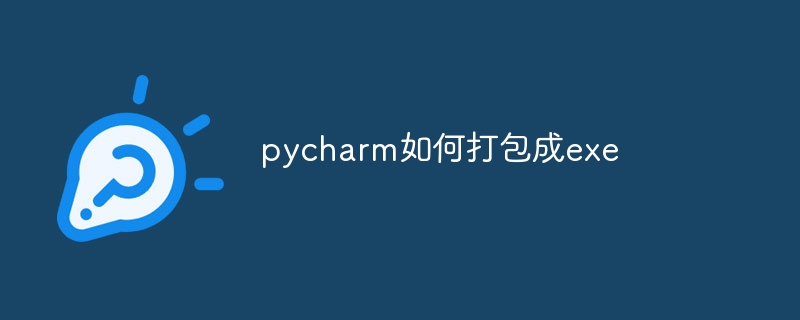
pycharm can be packaged into exe by installing PyInstaller, preparing to package the project, opening the command line, using PyInstaller to package the project, waiting for the packaging to complete and obtaining the packaging file. Detailed introduction: 1. Install PyInstaller and use pip install pyinstaller to install it; 2. Prepare to package the project and ensure that the project is completed and can run normally; 3. Open the command line and open the command line tool in the project root directory, etc.

The operating system for this tutorial: Windows 10 system, Python version 3.11.4, DELL G3 computer.
To package the PyCharm project into an executable .exe file, you can use the PyInstaller tool. PyInstaller is a tool for packaging Python code into a standalone executable file. It can package a Python project and its dependencies into a single executable file so that other users can run it without having to install a Python interpreter. application. The following are the detailed steps:
Step 1: Install PyInstaller
First, you need to make sure PyInstaller is installed. You can install it using the following command on the command line:
pip install pyinstaller
This will install the PyInstaller tool in your Python environment.
Step 2: Prepare to package the project
Open your project in PyCharm and make sure your project is completed and can run normally. Make sure there aren't any errors and dependencies missing.
Step 3: Open the command line
In the project root directory, open the command line tool (such as Terminal or CMD).
Step 4: Use PyInstaller to package the project
In the command line, use the cd command to switch to the root directory of your project. Then, use the following command to package the project into an executable file using PyInstaller:
pyinstaller --onefile your_script.py
In this command, your_script.py is the main Python file of your project, which is the project entry file. If your project has other dependencies or resource files, PyInstaller will automatically include them in the packaged executable.
--The onefile parameter will tell PyInstaller to package the project into a single executable file instead of a folder containing multiple files.
Step 5: Wait for the packaging to be completed
After executing the above command, PyInstaller will start packaging your project. This process may take some time, depending on the size and complexity of the project. Once packaging is complete, you will see the packaging results in the command line.
Step 6: Obtain the packaged file
After the packaging is completed, PyInstaller will generate a folder named dist in the project root directory, which contains your The project's executable file. You can send this executable file to others and they can run your application without installing a Python interpreter.
Conclusion
Through the above steps, you can use PyInstaller to package the Python project in PyCharm into an executable .exe file, which is convenient for others without installing Python. Run your application without the interpreter. Remember to always update and test your project to ensure successful packaging and handle any dependency issues promptly.
The above is the detailed content of How to package pycharm into exe. For more information, please follow other related articles on the PHP Chinese website!
 How to change pycharm to Chinese
How to change pycharm to Chinese
 pycharm installation tutorial
pycharm installation tutorial
 How to solve the problem that pycharm cannot find the module
How to solve the problem that pycharm cannot find the module
 How to install pycharm
How to install pycharm
 The difference between python and pycharm
The difference between python and pycharm
 How to configure the pycharm environment
How to configure the pycharm environment
 How to install the pycharm interpreter
How to install the pycharm interpreter
 What does pycharm mean when running in parallel?
What does pycharm mean when running in parallel?




